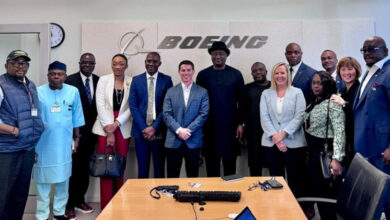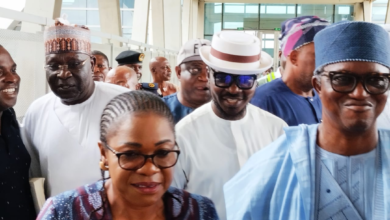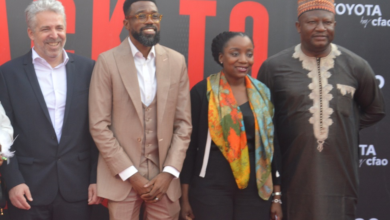#Nigeriablueeconomyconference: Delta State Eyes Investment In Sea Ports, Tourism, Rail, Airport, Agriculture, Housing, Others

Ahead of the Nigeria Blue Economy Stakeholders Conference in Lagos between 25th and 27th of January 2022, Delta State has raised hope that the development of Blue Economy in Nigeria will attract huge investment to the state in the areas of seaports, tourism, rail and road development, airport, agriculture, oil and gas, housing among others.
The event is organized by Alfe City Institution (https://alfecity.com/#/ms-1/2) will bring together the primary stakeholders of a prospective Nigerian Blue Economy including the nine littoral states, the Ministries and agencies that would be involved in the management of the new sector.
Olorogun Lucky Oghene-Omoru, Director General, Delta State Investments Development Agency (DIDA), who confirmed the full participation of the state in the forum said, “If the Blue Economy initiative is faithfully and successfully implemented in the nine littoral States, 11 River Basins and with a strong commitment by FGN and the State governments including MDAs which are considered to be the primary Stakeholders to the Blue Economy initiative and the Development Partners, the Country could substantially grow its GDP through investments in seaports, tourism, rail and road development, airport, agriculture.”
Delta State
Delta State is among the nine Littoral States with a total of 850km coastline out of which Delta State alone has 163km making the state to have about 19.2% of the country’s total coastline which is the longest. In addition, there are so many rivers that transverse the length and breadth of the state such as River Niger, Ethiope, Orogodo, Warri, Benin, Forcados and River Ramos, etc such that the State is easily a Blue Economy Hub.
Oghene-Omoru said all the 25 Local Government Areas (LGA) in Delta State shall be impacted by the Blue Economy initiative and specifically asked that the state as a critical Stakeholder in the proposed Blue Economy project should be included in the development of the initial conceptual framework and implementation processes.
Specifically, on tourism, he said, “Delta State is a tourism haven on account of its warm and highly hospitable people, spectacular sand beaches along the coastline, many cultural festivals, biodiversity of the ecosystem, historical monuments and sites among others. The State Government’s policy on tourism is to create the enabling environment through the provision of infrastructure and encouragement of a private sector-driven tourism industry.”
Oghene-Omoru believes that the challenges of the Blue Economy are global and will require global solutions that can be adapted to national and local priorities.
“The majority of the governments around the world should participate in the discussion about innovative methods, technologies, and cutting-edge research to tackle sustainable Blue Economy opportunities,” he said.
On the potential of the blue economy in accelerating economic growth of Nigeria, Oghene-Omoru said “it involves building an ecosystem of industrial and mercantile business activities in order to comprehensively harness the abundant natural, aquatic and marine resources of the Atlantic Ocean, Rivers, lakes, inland Waterways and the River Basins, etc in Nigeria.
“Incidentally, these aquatic bodies are characterized by marshy, swampy and difficult terrain which are costly to develop and pose challenges regarding the provision of infrastructural facilities.
“However, concerted efforts must be made to mobilize investment capital in order to turn these areas into the Nigeria’s industrial and business hubs and the grow the national GDP as was done in Cape Town in South Africa, Istanbul in Turkey, Singapore, Malaysia and many Australia and Chinese and USA cities to mention a few examples around the world.”
He made reference to a study in the USA which showed that a growing handful of coastal states, cities and counties are focusing their economic development efforts on industries that rely on the ocean.
According to the study, “participants in the blue economy shoreside communities contributed $385 billion to the gross domestic product in 2019 and supported 3 million jobs in more than 20 marine industries, including fishing, tourism, off-shore oil drilling and boat building.”
On the way forward for blue economy initiative in Nigeria, Oghene-Omoru said, “A UN-Habitat paper on Blue Economy and Cities to support coastal cities and districts in their processes of implementing sustainable development practices to seize Blue Economy opportunities underlines important aspects that coastal cities, waterfront cities, urban centres, local and national governments should bear in mind when creating their own economic opportunities, and environmental protection and spatial planning activities.
“Local and national governments should understand that Blue Economy includes all types of water bodies, including the world’s oceans, lakes, rivers, and wetlands.
Tourism potential in Delta State
“As the majority of the urban centres in the world are located along the coasts, they should acknowledge the value of the water bodies and harness them to create sustainable livelihoods, green and blue jobs, sustainable housing and infrastructure, waste management, ecological protection, and restoration of coastal and waterfront areas.
“National government policymakers, local government officials, marine protection experts and other civic stakeholders should integrate spatial planning and integrated coastal zone management for better economic, social, and environmental outcomes.
“Governments should anticipate, mitigate and adapt to the impacts of climate change. In addition, several plans and programmes should be set in place to prevent further degradation of the environment, focusing on waste management, wastewater, oceans, and marine pollution.
“Every government should involve and engage all segments of the population, including women, youth, and other marginalized groups.
“Governments should invest in data, science and cutting-edge technology to support governance prioritization, reforms, and shaping management decisions.”
WorldStage earlier reported that Benin Owena River Basin Development Authority (BORBDA), one of the 12 River Basin Development Authority River Basin Development Authorities (RBDAs) in Nigeria with coverage areas which include Edo, Ekiti, Ondo States and the northern Senatorial district of Delta State has confirmed participation in the Nigeria Blue Economy Stakeholders Conference in Lagos between 25th and 27th of January 2022.
Worldstagenews.com





